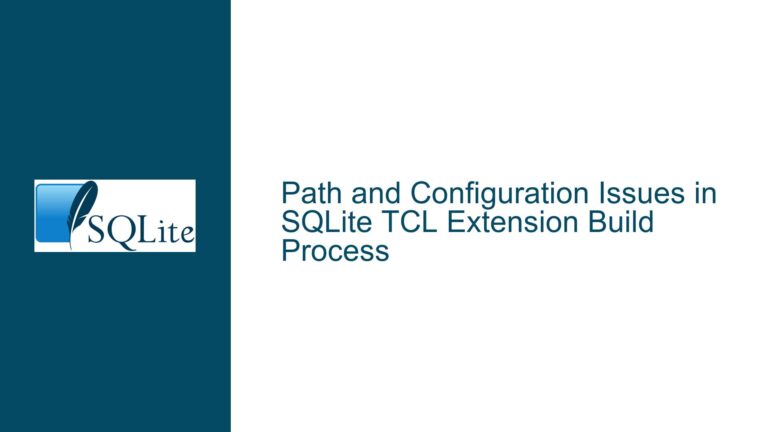SQLite UTF-16 Support and Implementation Challenges
SQLite UTF-16 Encoding and API Compatibility
SQLite is a versatile database engine that supports multiple text encodings, including UTF-8, UTF-16LE (Little-Endian), and UTF-16BE (Big-Endian). The encoding determines how text data is stored within the database file. By default, SQLite uses UTF-8 encoding unless explicitly configured otherwise. However, SQLite’s API provides flexibility in handling text data, allowing applications to interact with the database using either UTF-8 or UTF-16 encoded strings. This dual support is facilitated by internal conversion mechanisms that translate between the encoding used by the application and the encoding used by the database.
The PRAGMA encoding directive is the primary tool for configuring the database’s text encoding. For example, executing PRAGMA encoding = 'UTF-16'; sets the database to use UTF-16 encoding. It is important to note that this setting only affects how text is stored internally within the database file. The encoding used for communication between the application and SQLite (e.g., SQL statements, query results) is independent of the database’s internal encoding.
SQLite’s API includes functions specifically designed for UTF-16 interaction, such as sqlite3_prepare16, sqlite3_exec16, and sqlite3_column_text16. These functions allow applications to pass and retrieve UTF-16 encoded strings directly. However, not all SQLite API functions support UTF-16. For instance, sqlite3_exec, a commonly used function for executing SQL statements, only supports UTF-8 encoded strings. This limitation can lead to confusion and implementation challenges when developers attempt to use UTF-16 encoded SQL statements or retrieve UTF-16 encoded results using functions that lack UTF-16 support.
Misuse of sqlite3_exec with UTF-16 Encoded Data
One of the core issues arises when developers attempt to use the sqlite3_exec function with UTF-16 encoded SQL statements or expect UTF-16 encoded results. The sqlite3_exec function is a convenience wrapper that combines several steps—preparing a statement, executing it, and retrieving results—into a single call. However, this function is designed exclusively for UTF-8 encoded data. When a UTF-16 encoded SQL statement is passed to sqlite3_exec, the function fails to interpret the statement correctly, leading to errors or unexpected behavior.
Similarly, the callback function used by sqlite3_exec to process query results is also limited to UTF-8 encoded data. The callback signature expects char** pointers for both the data and column names, which are inherently UTF-8 encoded. Attempting to define a callback that accepts UTF-16 encoded data, such as using char16_t** or similar types, is not supported and will result in compilation errors or runtime issues.
This mismatch between the encoding used by the application and the encoding supported by sqlite3_exec highlights the importance of understanding the limitations of SQLite’s API functions. Developers must carefully choose the appropriate functions based on the encoding requirements of their application.
Transitioning to UTF-16 Compatible API Functions
To fully leverage SQLite’s UTF-16 support, developers must transition from using sqlite3_exec to the more granular and flexible sqlite3_prepare16, sqlite3_bind, sqlite3_step, and sqlite3_column_text16 functions. These functions provide explicit support for UTF-16 encoded data and allow for greater control over the execution and retrieval process.
The sqlite3_prepare16 function is used to compile a UTF-16 encoded SQL statement into a prepared statement object. This object can then be executed using sqlite3_step, which processes the statement and advances through the result set row by row. To retrieve UTF-16 encoded data from the result set, the sqlite3_column_text16 function is used. This function returns a pointer to the UTF-16 encoded text for a specified column in the current row.
For example, consider the following code snippet that demonstrates how to execute a UTF-16 encoded SQL statement and retrieve UTF-16 encoded results:
sqlite3* db;
sqlite3_stmt* stmt;
const char16_t* sql = u"SELECT name FROM users WHERE id = ?;";
int rc = sqlite3_prepare16(db, sql, -1, &stmt, NULL);
if (rc == SQLITE_OK) {
sqlite3_bind_int(stmt, 1, 42); // Bind a value to the placeholder
while (sqlite3_step(stmt) == SQLITE_ROW) {
const char16_t* name = (const char16_t*)sqlite3_column_text16(stmt, 0);
// Process the UTF-16 encoded name
}
sqlite3_finalize(stmt);
}
In this example, the sqlite3_prepare16 function is used to compile a UTF-16 encoded SQL statement. The sqlite3_bind_int function binds an integer value to the placeholder in the SQL statement. The sqlite3_step function executes the statement and advances through the result set. Finally, the sqlite3_column_text16 function retrieves the UTF-16 encoded text from the result set.
By using these functions, developers can ensure that their application correctly handles UTF-16 encoded data throughout the entire interaction with the SQLite database. This approach eliminates the need for manual encoding conversions and reduces the risk of errors caused by mismatched encodings.
Handling Encoding Conversions and Performance Considerations
While SQLite’s internal conversion mechanisms simplify the process of working with multiple encodings, they can introduce performance overhead. Each conversion between UTF-8 and UTF-16 requires additional processing, which can impact the overall performance of the application, especially when dealing with large volumes of text data.
To minimize this overhead, developers should aim to maintain consistency in the encoding used throughout their application. For example, if the application primarily uses UTF-16 encoded strings, it is advisable to configure the SQLite database to use UTF-16 encoding and use UTF-16 compatible API functions exclusively. This approach reduces the need for frequent encoding conversions and improves performance.
Additionally, developers should be aware of the memory implications of using UTF-16 encoded strings. UTF-16 typically requires more memory than UTF-8, as each character is represented by at least two bytes. This can lead to increased memory usage, particularly for applications that handle large amounts of text data. Careful memory management and optimization techniques, such as using efficient data structures and minimizing unnecessary string copies, can help mitigate these issues.
Best Practices for Working with UTF-16 in SQLite
To ensure a smooth and efficient experience when working with UTF-16 encoded data in SQLite, developers should adhere to the following best practices:
Explicitly Set the Database Encoding: Use the
PRAGMA encodingdirective to explicitly set the database’s text encoding to UTF-16. This ensures that the database stores text data in the desired encoding and avoids potential issues caused by default settings.Use UTF-16 Compatible API Functions: Avoid using
sqlite3_execand other UTF-8 only functions when working with UTF-16 encoded data. Instead, use UTF-16 compatible functions such assqlite3_prepare16,sqlite3_step, andsqlite3_column_text16.Minimize Encoding Conversions: Maintain consistency in the encoding used throughout the application to reduce the need for frequent encoding conversions. This improves performance and reduces the risk of errors.
Optimize Memory Usage: Be mindful of the memory implications of using UTF-16 encoded strings. Use efficient data structures and techniques to minimize memory usage and avoid unnecessary string copies.
Test Thoroughly: Thoroughly test the application to ensure that it correctly handles UTF-16 encoded data in all scenarios. Pay special attention to edge cases, such as handling non-ASCII characters and large text data.
By following these best practices, developers can effectively leverage SQLite’s UTF-16 support and build robust, high-performance applications that handle multilingual text data with ease.






